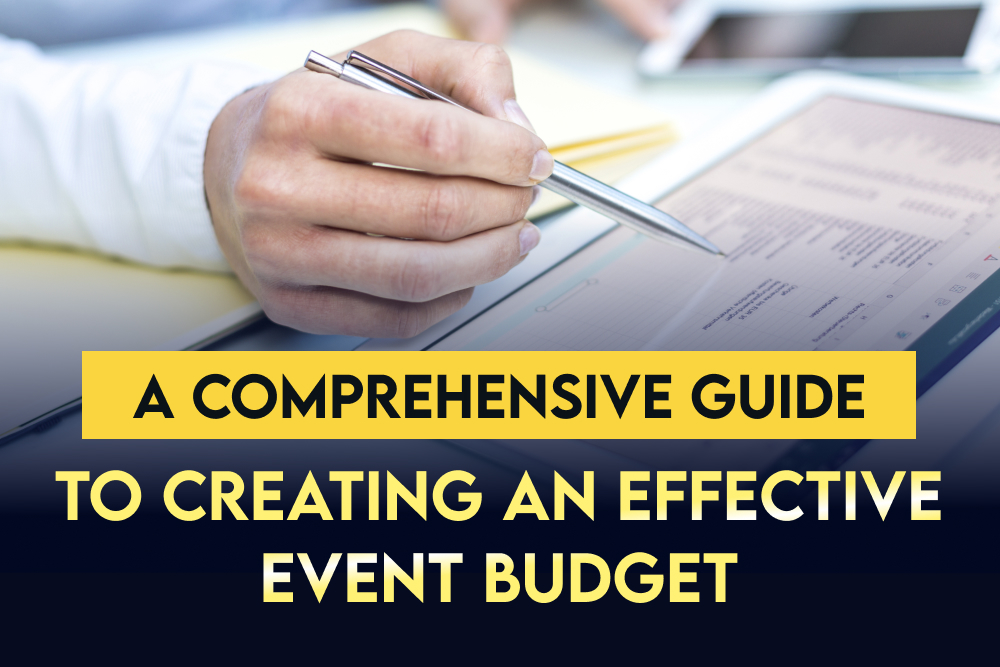

Head of HR at Rent For Event

Head of HR at Rent For Event
Is the thought of producing an event hard enough? Wait until you get into the nitty-gritty of budgeting – a task that many event planners dread.
Still, don’t let the numbers scare you. With the right strategy and monitoring, you can come up with a reasonable profit & loss (P&L) budget to maximize the profitability of your upcoming event.
In this post, we’ll guide you through the basics with expert tips straight from our event production team! Keep reading to know the dos and don’ts of event budget planning (especially tip #7).

An event budget is basically all the estimated costs of hosting and producing an event. This should include all the expenses from basic supplies to your venue rental, vendor payments, and so on.
Still, you should know that there’s no one-size-fits-all formula for event budgeting. After all, each event is unique and so are their needs. And when we say ‘needs’, it always has a corresponding price tag.
However, an event planner’s budget isn’t just about allocating $$$ on each expense. It’s also a financial plan to ensure that your event budget is in line with the projected profits of your event. This way, you can stay within your financial means while delivering a successful event production.
Proper budgeting is the first step toward the success of your event. If you’re planning your first event, here’s why you should dedicate more attention to budgeting:
Whether big or small, budgeting event needs isn’t an easy task. Vendors would change their prices regularly, unforeseen expenses can occur, and limited revenue streams can be an issue.
But despite all these hurdles, there are many ways for event planners like you to design a profitable and reasonable budget. Here are some of the expert tips from our team:
Many event planners are guilty of shooting blindly when it comes to handling their event budget. This can cause serious problems down the line, including a lack of funds for important event planning expenses.
So at the beginning, you should define your financial goals for your event. To help you, here are some questions you need to answer:
These are just some of the questions that can help you outline your financial goals for an event. By setting these aspects clear, you’ll have a more organized approach to allocating your working budget.
When talking about budgeting for events, it’s not just about how much you’re going to spend. You should also assess how much you plan to earn in comparison to your expenses (profit & loss).
With this, you should consider where you’re going to make money on your event. Most event planners we’ve worked with tap into these revenue streams:
Whatever revenue stream you’re working on, always be realistic about your target profits and always factor in the possibility of unforeseen expenses (more on this later).
The largest chunk of your budget goes to vendor fees and payments. For this part, you need to create a checklist of everything you’ll need – from rentals, venue selection, logistics, staffing, and more.
Take note that these needs depend on the type of event you’re planning. For example, if you’re planning a conference, you’ll definitely spend more on venue rental. But if you’re planning a wedding, you may have to allocate more funds to catering and venue.
Regardless of the event you’re planning, you’ll likely have these expenses on your list:
Now that you have a list of your event essentials, the next step is to scout for the best vendors. If you’ve done events before, you probably have most of the items we listed above already covered.
But in general, you should shop around for quotes and estimates. From there, compare the vendors and see which suits your budget without compromising the event. Don’t hesitate to negotiate with vendors to get better deals or discounts.
If there’s one takeaway we want you to have in this post, it would be this: never mental note your expenses.
We’ve worked with many event planners and most first-timers have this as their common pitfall. Instead, you should create an actual spreadsheet with a detailed event planning cost breakdown down to the last cent.
This way, you can track and adjust your budget on the go. Also, seeing everything in one place prevents you from overspending.
If you’re looking for event budget templates to start with, we highly suggest the 70-20-10 rule. Here’s how this concept works:
Take note that this rule may or may not work, depending on the needs of your event. Still, it helps in starting out a working budget. From there, you can adjust the allocation as needed.
If you’ve been in the event planning industry for some time, you’ve surely heard the term “scope creep”. This is when the event goes beyond the original plan and budget. It usually happens slowly and unnoticed as the event planner adds “innocent-looking” elements to the event.
As these small additions compound, you’ll be surprised that the event has already fallen outside the budget. Worse, you barely have enough time to adjust and you’re already overspending.
This is why we always highlight the importance of tracking your budget on a spreadsheet. That way, you won’t end up writing a check you can’t cash.
The effectiveness of your budgeting will be measured once the event is over. At this point, you’ll be calculating total costs and revenue to see if you’ve met the financial goals you set earlier.
For this part, you need to identify where you exceeded the budget, where you can save money, and what unexpected costs have occurred. All these notes will be very valuable for your next event planning.
If you’re looking for ways to stretch your event budget without compromising quality, Rent For Event can help. We offer full AV production for all events and our team can work within your budget.
With us, you’ll have a complete team of AV experts producing your event. Our team will provide all your needed equipment, operate them, and tear it down after your event. All you have to do is watch as your event unfolds!
We can also give you a free event budget sample spreadsheet to make planning easier. So contact us today and let’s start planning your next event!